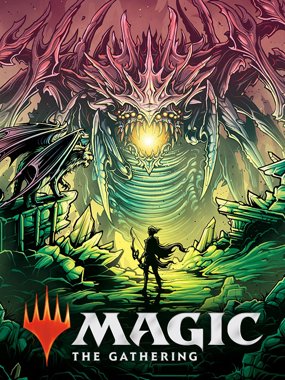Magic: The Gathering

The name Magic: The Gathering is familiar to everyone who is into any CCG. This is the progenitor of the genre, which has raised more than one generation of "gamblers". Magic: The Gathering Arena makes the beloved game available to gamers anywhere in the world.
The project we've been waiting for
Fans of "magic" have not had a decent platform for playing for a long time. Yes, there is Magic: the Gathering Online, which continues to this day, but in-game purchases in it hit the wallet hard. And the game released in 2002 looks poor compared to more recent competitors.
Publishers from Wizards of the Coast have tried to launch on mobile platforms - Magic Duels came out in 2015. The game suffered from an abundance of bugs and did not gain much popularity. After 2 years, the developers stopped supporting the project.
And finally, in 2019, Magic: The Gathering Arena was released - a modern view of developers on how the digital version of the "mother" of all CCGs should look like. The game turned out to be user-friendly and colorful. Some cards have visual effects - playable monsters will fly out onto the battlefield, spells create colorful projects.
Magic: The Gathering Arena Gameplay
The gameplay in Magic: The Gathering Arena is almost identical to the tabletop original. Players build a deck of 60 cards and fight each other, trying to reduce the enemy's health to zero.
In the process, they play different types of cards - mostly creatures with certain characteristics. Each of them has attack and health indicators, and can also have special abilities indicated in the text of the card. To play creatures, you need energy or mana - a special resource, for which you must have land cards on the player's table.
Why is it so difficult?
Magic: The Gathering has a high barrier to entry. Many are stopped by the local mana system mentioned above. Lands give energy of different colors, swamps - black, forests - green, mountains - red, and so on. There are 5 land colors in the game. For example, to play the Molderhulk card, you need to have one black energy, one green, and any seven others - for a total of nine.
Land balance in a deck is a very important aspect of the game. Put a few of them and - there will be nothing to "power" the rest of the cards. Do the opposite and you will no longer have enough penetrating power. There are unspoken standards in the game: usually decks are built on two colors of energy, sometimes three, and very rarely more. The optimal number of mana cards is considered 20. However, no one bothers and experimenting.
Also, for those who migrated from the simpler CCGs, the order of the move may seem difficult. It consists of several phases in strict sequence. The fight alone is divided into three stages. First, the player chooses his attackers, and the enemy defenders, who will take the attack. The enemy can refuse the block, in which case he will lose health. Also, creatures that take non-lethal damage are fully healed at the end of the turn.
Minus or plus?
Yes, this complexity of combat can scare off some newbies. But at the same time, it is also one of the coolest features of Magic: The Gathering. Hearthstone players know this unpleasant feeling when an opponent has collected a lethal combination in his hand and begins to play it. It remains only to watch how the health of the "face" falls to zero. In "magic", the player always has the opportunity to prevent such a scenario, because every action of the opponent can be answered.
For example, an opponent sends a weak monster to attack, but you don't block. The enemy sees that you are taking damage on yourself, and gives him a powerful buff. And you are just waiting for this - you have a card that allows you to redirect the attack to your opponent. Thus, you will completely turn the situation to your advantage.
Also in the game there is a tutorial that greatly simplifies the comprehension of the intricacies of the game. The player will be guided through all the mechanics by the handle. If he has a card with special mechanics, they will explain it. The interface is user friendly. It is not necessary to memorize the order of actions, roll cubes, count energy, remember in which of the phases you can cast a spell - all this is done intuitively or prompted by artificial intelligence.
Gathering Cards in Magic: The Gathering Arena
There are many ways to expand the collection in MTGA. For victories, the player will receive level points, with which the "mastery tree" is pumped, giving access to unique cards. Boosters are purchased for both virtual currency and real money. They can also be obtained from physical sets of cards - each will contain a card with a code that can be activated in the game.
By purchasing boosters, the player receives "jokers". These are kind of tokens that can be exchanged for any card of similar rarity. This system has migrated to other.


















